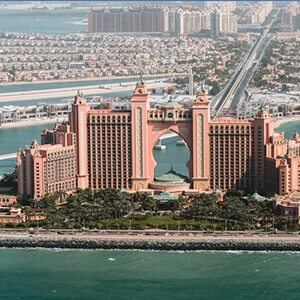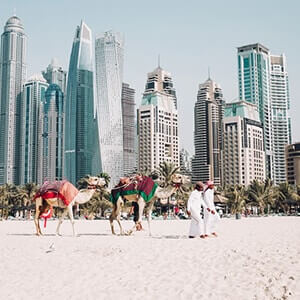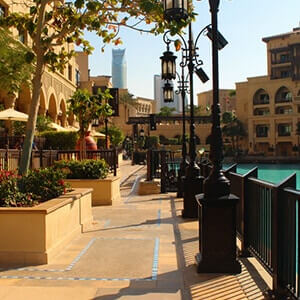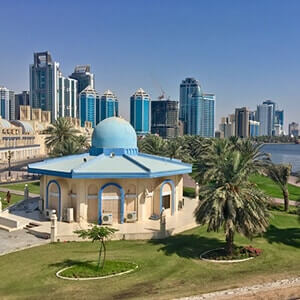Moving to the UAE
As one of the top places for expats, moving to the United Arab Emirates is an exciting step, with the country combining development and tradition perfectly. The 7 emirates, the most famous being Dubai and Abu Dhabi, have a wealth of opportunities and sceneries for people of all interests. While the different areas have different and often strict interpretations of the traditional laws of Islam, living in the UAE is a great place for people seeking modern and innovative progress in many fields.
For Brits, the culture shock when moving to the UAE can be difficult to navigate, with some new and important key laws for women and couples. Our detailed country guide has been put together to ensure you have all the information before moving to the UAE from the UK, including everything from where to live, moving your belongings, and even taking pets with you.
United Arab Emirates Orientation
Living in the UAE can be very comfortable for expats. Though the native language of the UAE is Arabic, it is common to hear English in the cities more influenced by western countries, such as Dubai and Abu Dhabi. This reduces the problems that a language barrier can bring for people moving to the UAE from the UK and will ensure a smoother relocation process. With any issues, there are a number of English-speaking translators available to help you.
As the UAE is on the other side of the world, the time difference might be difficult to navigate when contacting people at home in the UK. The UAE runs on Gulf Standard Time (GST), which is Greenwich Mean Time plus 4 hours, or Eastern Standard Time (EST) plus 9 hours.

Documents prior to travel
Like any international move, documentation is vital when preparing to travel to the UAE. If you are hoping to relocate to the UAE, finding a job that is based in one of the emirates is a great way to ease the process, as it is common for employers to provide passport, visa and permit assistance to their expatriate employees, whether this is in-house or through an outside vendor. Taking advantage of this support ensures that your unique situation can be accounted for and you, as well as your employer in the UAE, remain in compliance with destination and home country laws.
Passports – When moving to the UAE, newcomers should ensure that every individual travelling has a valid passport and that passports will be valid for longer than the length of time to be spent in the country. This will allow for any later issues. You should also check for any additional requirements at the destination country’s nearest consulate.
Visas and permits – A visa is a document to be approved by a country’s government that will permit you as a foreigner to enter that country for a specified purpose and length of time. This can be inside your passport, on a separate paper or electronic. There are many types of visas for travel to the UAE, so it’s strongly advised to obtain expert guidance for this step in your international relocation.
Your UAE visa process can often be carried out or begun by your employer, so it’s important to discuss this with them. Find out more about visas and work permits in the UAE.
Customs Requirements for the UAE
Customs procedures and requirements are always subject to change, so consult your shipping agent for up-to-date information.
If you obtain a Residence Permit, used household items and personal effects can be transported duty-free in and out of the UAE. New household items may incur a fee. More than UAD 100,000 (GBP 19,740) in cash must be declared upon arrival or departure.
Restricted Items
Consult the Federal Customs Authority (FCA) for up-to-date details and read the Customs Guide.
The UAE Customs Ministry must be contacted to request approval before you import any of the following items:
- Political or religious literature
- Firearms or weapons of any kind, including toys
- Any alcoholic beverages, including wines
- Narcotics and drugs
- Items made of ivory or from endangered animals
- Broadcast transmission and reception sets
- Any items produced in Israel
- Counterfeit money
- Statues, figurines, or any artwork that might be considered erotic, according to Islamic guidelines
- Pornographic material
- Pork meat and products
You will need a health certificate to bring any plants or plant material when moving to the UAE, and medications and food items will need to be inspected by the Ministry of Health so it’s important to pack these separately.
Also to be packed separately for entry to the UAE are printed materials, pictures, video materials, compact discs and computer software. These items are all subject to confiscation and censorship so must be easily accessed and examined.

Taking a vehicle into the UAE
Your employer may have placed a weight or volume restriction on the size of your household shipment, which could affect your decision to include your vehicle in your shipment. We advise checking this before transporting your car to the UAE.
If you do decide to import your car, it will need to conform to specifications for use in the UAE. An invoice and certificate of origin will also be required. You will also need a visa to show a UAE residential address when importing cars. Specifications also stipulate that it’s not legal to import or operate a vehicle with windows tinted more than 30 per cent. As driving is on the right side of the road, cars with the steering wheel on the right side are not permitted to be registered in the UAE, even if they’ve been converted to the left. They should also be given protective undercoatings as there are corrosive salts in the air and constant erosion due to blowing sand.
Registration of second-hand vehicles requires a lot of documentation including registration forms, passports, driver’s licenses, insurance, employer’s letters and more. Buying a new car in the Emirates is fairly easy and inexpensive.

Taking a pet into the UAE
It is not encouraged that you take your pet with you when you move to the UAE. Pets are not favoured by the culture or the climate. Documentation and other requirements for cats and dogs include:
- Health Certificate from home country veterinarian
- Record of vaccinations, including rabies shot within 1 year but at least 30 days before travel
- Microchip must be implanted in the pet
- Animals must be at least three months of age
- Copy of owner’s passport
You should check with the UAE Ministry of Environment and Water (MOEW) or the UAE Embassy in your home country for more up to date and detailed information on permits and quarantine periods.
UAE Banking services
The financial sector in the UAE is extremely strong, with UAE banks holding one of the largest equity shares in the Middle East. Local and international banks provide full personal banking services with a good supply of ATMs in the city. Expats moving to the UA will require a valid employment visa and identification card to open a bank account, which then allows mobile payment platforms to be used.
Money can be moved freely in and out of the country thanks to the lack of foreign exchange policies, however cashing personal cheques can pose an issue. In more rural areas, cash is a more definite way to ensure payment is accepted.
UAE Currency and Exchange
The United Arab Emirates currency is the dirham (AED) and is fixed to the U.S. dollar. Every dirham is 100 fils, and denominations include 5, 10, 20, 50, 100, 200, 500 and 1000 dirham notes. Notes have both English and Arabic written on them while coins are in Arabic only.
In terms of exchange rates, you may want to check your local bank and resources for the best deal. In the UAE, banks on the street will usually offer the best rates and often have desks at major hotels and airports.
Find out if we could help you and your business get the most out of your money with Gerson’s International Currency Services.

Finding a home in the UAE
When moving to the UAE from the UK, many people use a relocation advisor to find a place to live. An extra fee of around 5 per cent will be taken by a rental agent in addition to your annual rent. Properties to rent are advertised on real estate websites, and word of mouth around the community is also a great information source.
Foreign ownership of property is prohibited in many parts of the UAE, but it is permitted in Sharjah, Ras-Al-Khaimah, and a section of Dubai. Expats living in the UAE usually rent accommodation. Accommodation to rent is normally unfurnished with only the most basic kitchen appliances. Furnishings and additional appliances are available to purchase locally. When renting, 6 months’ rent upfront is the minimum expected while advance payment in full is often requested.
Types of Accommodation in the UAE
When moving to the UAE from the UK, many people use a relocation advisor to find a place to live. An extra fee of around 5 per cent will be taken by a rental agent in addition to your annual rent. Properties to rent are advertised on real estate websites, and word of mouth around the community is also a great information source.
Foreign ownership of property is prohibited in many parts of the UAE, but it is permitted in Sharjah, Ras-Al-Khaimah, and a section of Dubai. Expats living in the UAE usually rent accommodation. Accommodation to rent is normally unfurnished with only the most basic kitchen appliances. Furnishings and additional appliances are available to purchase locally. When renting, 6 months’ rent upfront is the minimum expected while advance payment in full is often requested.
Short-term Accommodation
Before you find permanent housing in the UAE, there are many options for intermediate arrangements. Major hotels can be a good choice for expatriate families, particularly working for large corporations, as they offer fully furnished accommodation with kitchen facilities. There are also apartment complexes in the Emirates that cater to temporary residents waiting for their accommodation, which can be found listed online by global stay providers, local facilities and expat communities.

Getting around in the UAE
Driving – If you want to drive in the Emirates, you will need to obtain a local driving license. Requirements for these will differ in different areas. It may also be possible to exchange an existing foreign license and you can find out more details on which licenses can be exchanged. For short term stays, a temporary driving license for use in hire cars is also available.
It is common for expats living in the UAE to procure a car when they relocate, so remember that you will require third-party liability insurance. Infrastructure and roads are generally good quality, but you must remember to give way to pedestrians and animals. Carefulness is vital as speeding and aggressive driving is common. Signage, though normally in English as well as Arabic, can be scarce so plan your journeys well before starting out.
Taxis – For people that do not want to drive, the Taxi service in the Emirates can be a good alternative. They are highly visible in cities and very affordable. It’s a good idea to have instructions in Arabic in case the driver does not speak English. There are safety tips, such as not engaging the driver and avoiding taking Taxis alone at night. Limousines are also popular for business trips and expats.
Public Transport – There is an efficient network of buses throughout the Emirates, however, they are slow and rarely used by expat living in the UAE. There are websites for each bus service of the main Emirates i.e. Dubai, Abu Dhabi and Sharjah. The Dubai Metro is fully automated and various types of one-off or regular tickets are available, with bus and taxi connections at each station. The abra is also available for trips between Deira and Dubai, with other water transports also available elsewhere. For more details on marine transport, visit the Roads and Transport Authority (RTA) website.
Cuisine in the UAE
Native cuisine derives from Persia and consists often of carefully prepared poultry, lamb or beef paired with rice and fresh herbs. Seafood is common and fresh vegetables, as well as dates and spices, are in abundance. Pork is widely forbidden as in Islamic law. Buying food at supermarkets is common, but there are also open-air markets called souks – take cash here for haggling for everything from fresh fruit and vegetables to gold and carpets. Make sure to disinfect food bought here despite laws regulating freshness.
Bargaining is part of general practice in many places, except supermarkets, and with the right attitude can add to the fun of shopping.

Clothing & What to Wear in the UAE
The climate and conservative Islamic moral codes call for an adaptation to western clothing customs. While it’s considered rude to adopt traditional Muslim dress, open-necked shirts are not appropriate. Lightweight shirts and suits are recommended for warm weather, but ties are always a must. For businesswomen, conservative and loose-fitting clothing is suggested. Necklines should be high, upper arms and shoulders should be covered and hemlines should be below the knee to align to the strict Islamic codes. Footwear will depend on the workplace.
Expatriate Community in the UAE
People moving to the UAE will find a welcoming and active expat community waiting for them. A supportive environment is created by the vibrant business atmosphere and the traditions of Arab hospitality. The financial opportunities and lifestyle are excellent for expats, meaning that almost 70 per cent of the UAE’s total workforce is expatriate. It is also an excellent place for integrating children successfully so moving with family is no problem. International schools are available to serve many expat families from all over the world.
UAE Moves Weekend to Saturday Sunday
If you are unfamiliar with the United Arab Emirates working routines then this might not have been a concern of yours before making a move. However, news that the UAE is moving to Saturday Sunday weekends in 2022 has been welcome news to global markets. Officials will now actually have a 4 and a half day work week, finishing at noon on Fridays. Previously, the UAE has worked a 6 day week and most recently worked with a Friday and Saturday weekend.

Social Life
For couples, singles or families, the UAE is full of opportunities for an exciting and busy social life. With a warm climate and accessibility to beaches, a slower pace of life and focus on health and wellness is emphasised. There are a wealth of popular sports to play and watch, with regular and new sports for people moving to the UAE from the UK. International companies allow for networking events and facilities, whilst clubs are a great way to meet people – this goes for adults as well as children.

Dining out and Drinking Alcohol
Eating out is a popular pastime in the Emirates. The diverse population and economy create a huge variety of cuisine choices for everyone to enjoy. This range runs from fine dining to familiar chains of fast-food establishments. During Ramadan, many places serving food will be closed during the day, however, some cafes will remain open for business.
The drinking of alcohol is normally confined to hotels due to the rules of Islam, but this is becoming less strict in Dubai.
Religion
The official religion of the UAE is Islam, however, the Emirates do have freedom of worship. Protestant and Catholic churches are seen in the centres of both Abu Dhabi and Dubai. Other denominations and faiths are also represented, including the Church of Jesus Christ of Latter Day Saints, Evangelical Church, Syrian Orthodox, and Jacobite. Consult your country’s embassy or consulate for more information on suitable religious services for you.

Social Customs in the UAE
Living in the UAE takes some getting used to in many ways. One of the most difficult things to get accustomed to is the list of social customs and nuances in behavioural rules. Society in the UAE is largely respectful, hospitable, and conservative. The best way to learn the ways of life in the UAE is to experience it for yourself, however, we have prepared a few tips to prepare you before your UAE relocation.
Body language and gestures – It may take time to become used to how close conversation participants stand in the UAE compared to the western countries. Eating, shaking hands or gesturing with your left hand can be considered rude in the Emirates. More behavioural rules in the UAE are listed below:
- Never lose your temper, but stand your ground in negotiations.
- Stay consistent and patient in your responses.
- Do not show another person the soles of your feet – keep them firmly planted on the ground.
- Do not cross your legs.
- Avoid verbal commitments unless you are ready to stand by them in writing.
- Avoid saying “no” directly. Evasive remarks are preferred, and will be construed as a “no.”
- Avoid public displays of affection with the opposite sex.
- Normal tourist style photography is usually permitted, but avoid taking pictures of mosques, military installations, and Emirati women.
It’s also worth mentioning that if you’re moving to the UAE, there are several unexpected laws to be aware of. For example, gossiping and swearing are both grounds for deportation or a large fine. When in public, it’s a good idea to adhere to the behaviour of the people around you or ask for advice from local friends and colleagues.
Social entertaining – It is common that people will dine out to entertain guests, in business or otherwise, at restaurants or hotels. 15% is the typical amount to leave as a tip if not included in the bill. The UAE has a wealth of entertainment options such as watching theatre, concerts or sporting events.
The UAE has a culture of being generous hosts. This means that it is impolite to refuse an invitation to a host’s home, even if you don’t ever finalise plans for the visit. Equally, if someone is being evasive and vague about meeting up, don’t push them as this is the polite way to refuse an invitation. This means that it is impolite to refuse an invitation to a host’s home, even if you don’t ever finalise plans for the visit. Equally, if someone is being evasive and vague about meeting up, don’t push them as this is the polite way to refuse an invitation.
You must also respect local customs of segregating the sexes in many environments, private and public. This might mean that dinner parties have separate rooms for men and women.
If we could help you in your relocation to the United Arab Emirates, contact us to get a quote for your move today.
Interested in information on another country? Take a look at our other International Relocation guides.
Great customer Experiences start here
Very pleasent and helpful. Nothing too much trouble.
Mr M H moved from London, UK to Toronto, Canada
Very helpful and patient even when things got packed that we had to get out again!
Mr M E moved from Enfield, UK to Dorset, UK
Thanks to Graham, Nick and the entire crew!
Mr C D M moved from UK to Singapore
Friendly and helpful crew.
Ms T W moved from USA to Cambridgeshire, UK
